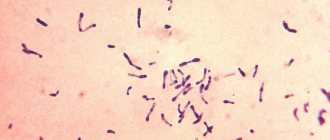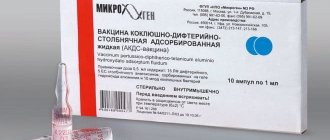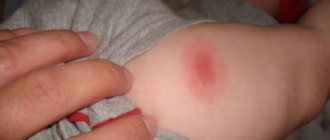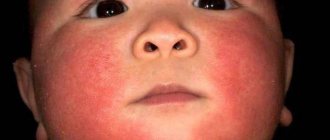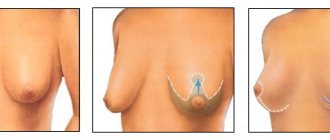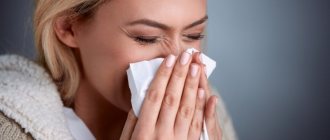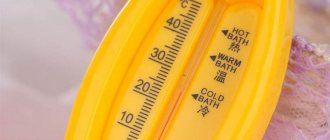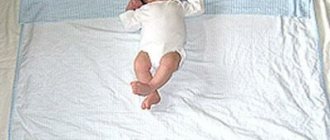Immediately after birth, the child is very defenseless against various diseases, he has no immunity to pathogens, and the body cannot independently fight pathogenic viruses and bacteria. Without vaccinations, immunity is developed only after the child has suffered certain diseases, and then not in all cases. This takes a lot of time, in addition, some diseases are extremely dangerous to health, which increases the risk of death. Another problem is that there are diseases for which modern medicine does not have effective drugs; the only way to guarantee a favorable outcome is vaccinations. The child receives most of the vaccinations in the first year, many of them are then repeated, due to which immunity is strengthened.
Temperature after DPT and polio vaccination
What is DTP
If all parents know what the polio vaccine is, then the incomprehensible abbreviation DTP causes concern among some. The name of the vaccine stands for adsorbed pertussis-diphtheria-tetanus. Three vaccines are simultaneously introduced into the child’s body; they form immunity against the listed diseases. The most aggressive vaccine among them is whooping cough. Manufacturers who do not have the most modern equipment and do not pay due attention to technology compliance allow the presence of traces of liposaccharide and pertussis toxin in the vaccine; these substances provoke acute reactions in the child’s body.
What is DTP
Practical advice. Buy vaccines from the most famous manufacturers; price should not play a major role. Remember that some domestic pharmaceutical companies are not able to produce vaccines of world-class quality - they do not have a license or the necessary equipment.
The word adsorbed means that antigens are concentrated (sorbed) on a special substance (aluminum hydroxide), which increases the strength and time of antigenic stimulation. These factors are very important during the formation of immunity.
Responses of the child’s body to DTP vaccination
Conclusion. Never refuse vaccination, do not put his health and life at risk. Do not use cheap analogues; the cost of treating a disease is always tens of times higher than the price of the highest quality vaccine, not to mention the health of the child.
How to behave after administration of the drug
Within twenty-one days, the body completely develops immunity to infections after the administration of the appropriate immunobiological drug, so it is necessary to monitor the child’s condition all this time. What needs to be done on different days after administration of the drug, and what to pay attention to.
Twenty-four hours after the injection
Typically, it is at this time that the maximum number of elevated temperature reactions is observed. The most reactogenic is considered to be the adsorbed pertussis-diphtheria-tetanus vaccine. After its administration, before bedtime, if the thermometer does not rise above 38 degrees, it is recommended to give the baby a suppository with an analgesic and antipyretic from the anilides group (for example, the active substances of Panadol, Efferalgan, Tylenol and others).
If the child’s temperature rises above 38.5, pay attention to drugs with an antipyretic effect, which include analgesics and antipyretics from the anilide group, or metamizole sodium. The latter is given according to the recommended dose. If it doesn’t help, call a doctor, just don’t give different antipyretics, they can block the effect of the drug.
To prevent overheating, it is forbidden to use metamizole sodium, which causes serious complications. There is no need to wipe the child with diluted acetic acid, which will only dry out the skin and worsen the situation in the future. If you want to wipe your child's body, take a damp cloth or towel and soak it in warm water.
Forty-eight hours after drug administration
If you have been vaccinated with a vaccine containing antigens, be sure to give your baby anti-allergy medications as prescribed by the treating pediatrician. This will prevent the development of unwanted swelling or other reactions.
If the temperature also rises, bring it down using the antipyretic drugs that have been described. Be sure to keep the temperature under control, do not allow it to fluctuate erratically or get too high. Overheating can lead to seizures, and in this case, hospitalization of the child is necessary.
Fourteen days after administration of the drug
After two weeks, a reaction to any vaccine can occur, but most often it is not about the drug mentioned in this article. Although, in exceptional cases, a sharp rise in temperature may occur after the first week. It almost never happens instantly, so it can be easily controlled using classical pharmacological agents that your doctor will recommend to you. Most likely, an increase in the thermometer during this period signals a possible viral infection, and not a reaction to the administered drug. Also, sudden jumps or overheating of the baby is possible during teething.
If the injection site is swollen or red, then temperature fluctuations may be due to this. In this case, the safest method of treatment is lotions with an analgesic at the injection site; they relieve inflammatory and pain reactions.
The medical immunobiological drug discussed in this article is an effective way to protect the baby, but at the same time it is the most dangerous. But basic knowledge and rules of behavior will help you, as well as your child, get through this period easily and without dangerous consequences.
Why are DPT and polio vaccinations needed?
Unfortunately, in recent years, due to negative coverage of the results of vaccinations in the media, many parents refuse to vaccinate their children and thereby expose them to mortal danger or disability. Today, a rather negative attitude towards vaccinations against DTP and polio has been artificially formed. News reports often focus on reports of isolated negative consequences, but never talk about how many lives vaccination actually saved. Negative reactions of a child’s body are very rare; their severity depends not so much on the vaccine, but on individual characteristics and the presence of hidden diseases. According to the calendar, the DPT vaccination must be done four times, the first when reaching the age of three months, the next two with an interval of 45 days, and the last at the age of one and a half years.
Vaccination calendar
The risk of children contracting such dangerous diseases is very high; they are difficult to tolerate and can cause complications, including paralysis of the limbs. Vaccination is carried out in the vast majority of countries in the world; the timing of administration of DTP and polio vaccines coincides, therefore they are included in the calendar at the same time. There are no additional negative side effects from combining these vaccines. The main requirement is compliance with the rules of administration, preparation of the child, and good health.
DTP vaccine
Opponents of vaccinations should know that before their introduction, approximately 20% of children suffered from whooping cough, of whom 50% died. The percentage of deaths from tetanus, even in the most developed countries from a medical point of view, exceeds 85%. Before vaccinations, 100% of children suffered from whooping cough, with 4% having a fatal outcome. If we refuse mass vaccinations today, the situation will inevitably repeat itself.
Poliomyelitis in a child
Why does the temperature rise after DPT and polio vaccination?
Medical practice confirms that of all vaccines, DTP is the most difficult for children to tolerate; this fact worries parents. Side effects appear within the first day after administration of the drug and can persist for up to three days. This is a normal reaction of the body, which fights pathogenic organisms that have entered it and develops immunity. If after vaccination there are no changes at all, then this condition is considered abnormal and requires a thorough examination of the child’s body.
Table. Functionally acceptable reactions to the vaccine.
| Child's reaction | Short description |
| Slight redness and swelling at the injection site | A child's skin is very delicate and actively reacts to various injuries. During the injection, the needle irritates the skin, which inevitably causes it to redden. The same reaction of a child’s skin is observed after ordinary scratches or other damage - it swells a little and turns red. The symptom goes away on its own by the end of the first day. Of course, during vaccination, the doctor must strictly follow the rules of disinfection and not introduce pathogenic organisms. |
| Slight decrease in appetite, lethargy and apathy | The internal forces of the body are thrown into the fight against viruses, which requires a lot of effort. Accordingly, the child feels uncomfortable, moves less, and sleeps more often. Loose stools may appear. |
| Temperature increase | This is a consequence of the fact that the vaccine has begun to work, the body is trying to cope with the pathogens. A completely natural reaction, but only when the temperature does not go beyond the established norms. Which ones exactly – we’ll talk about this in more detail below. |
How to protect your child
Many doctors believe that it is the educational system that becomes the basis for the child’s well-being after the administration of the drug. If you do not adhere to the basic rules of feeding, walking, ventilating the room, and do not know the list of antipyretics, then you should pay special attention to this and consult with your doctors.
Popular Protecting the body from tetanus with vaccination
Evgeniy Olegovich believes that the reaction to the vaccine directly depends on the load on the infant’s intestines. On the day of drug administration, and also 24 hours later, reduce the amount of food you eat as much as possible. Don't feed your baby until he asks. Keep in mind that food should be as liquid as possible. To check its acceptable consistency, put a spoon down; if it sinks, feel free to feed the baby.
A specialized store-bought mixture or porridge should not be thick either. If the instructions say to use 5 spoons, add one less. If the baby does not have problems with weight, then you can add one less spoon (3 spoons). Don’t worry, the baby won’t starve, but will tolerate the vaccine much easier.
There is another important law: you should not look for an additional virus for your baby after or before the vaccine is administered. It would seem, which parents themselves would put their child at risk? But still, they do not follow simple laws: they walk on playgrounds, invite guests to their house.
Let's give an example: a baby was born three months ago. Protein compounds in the blood plasma, which prevent the proliferation of microorganisms that he received after birth, cease to be so active. The parents planned a trip to the hospital. And what awaits the child there? You have to stand in line and go around all the doctors. And where, if not in a medical institution, is the risk of a baby’s contact with sick children greatest?
And so, the doctors say that the baby is completely healthy and give permission for the procedure. But this all happens within 24 hours. Then mothers and fathers begin to look for the reason for the increase in readings on the thermometer, why the child is burning, and they think: “How to bring down the temperature after the DPT vaccination?” Who should be blamed: the procedure, or illiterate parents?
Remember that you should not leave the medical facility after administering the drug. The specialist will advise you to walk or sit in the hall for 30 minutes in order to provide first aid in the event of an allergic reaction and eliminate adverse symptoms. Don’t sit in the clinic all the time; you can take a walk in the courtyard or sit on a bench. Let the child breathe fresh air rather than come into contact with sick children.
According to Komarovsky, the baby’s well-being after the injection depends on many things. And is it necessary to blame everything on the vaccine? Parents have no choice but to walk for a long time along the corridors of the hospital and bring a child for an injection, whom they overfed and overheated, and then, after the procedure, gave him a bottle of formula to calm him down. He developed a fever, but it was all the fault of the vaccine, definitely not them.
As for walking and airing the room. Is it possible to go outside, or is it better to abstain for 72 hours and stay in a confined space and a stuffy room? Many experts, such as grandmothers or experienced mothers, believe that after the procedure, bathing the baby and going outside with him is prohibited, and he needs to eat to replenish his strength. Of course, if the temperature has risen, you shouldn’t go outside. But if the baby is doing well, then you can take a little walk with him. It definitely won't hurt him.
What symptoms should parents be wary of?
Unfortunately, some children react negatively to the vaccine; their reaction is considered atypical and requires qualified medical intervention. The percentage of complications is tiny and always happens in all countries.
- Anaphylactic shock. Blood pressure levels drop, the rhythm and heart rate are disrupted, and the child may lose consciousness. Such reactions of the child’s body begin within the first hour after vaccination; during this entire time you cannot leave the medical institution. To minimize negative consequences, urgent resuscitation medical procedures are required.
Anaphylactic shock - Quincke's edema. A severe allergic reaction in which the larynx and mucous membrane of the nasopharynx swell. Only qualified and urgent medical care can save a child’s life. Quincke's edema also occurs immediately after the vaccine is administered.
The child has Quincke's edema - Convulsions at normal body temperature . The cause is brain damage and requires very serious treatment.
- Encephalopathy . The clinic appears after brain damage, but not immediately; there may be a delay of up to a month. A severe complication that requires hospital treatment under constant medical supervision.
Encephalopathy on MRI
As already mentioned, such complications occur extremely rarely and, if measures are taken in a timely manner, disappear without a trace. Lethal cases account for thousandths of a percent of the total number of vaccinated children.
If the temperature does not go down
If during the post-vaccination period the thermometer readings reach +38.5...+39 °C, and the temperature is not brought down with the help of medications, you should urgently consult a pediatrician or call an ambulance.
Such symptoms may indicate the development of an allergic reaction and complications of immunization. You should not try to help your baby on your own during prolonged and intense heat: the risk of serious consequences is high.
Increase in body temperature after vaccination
This is a physiological reaction of the body to the ingress of foreign bodies; antibodies to the introduced pathogens are produced in the blood. Doctors distinguish three categories of hyperthermia:
- 37.5°C – weak;
- up to 38°C – moderate;
- above 38°C – strong.
Important. Medicine does not recommend giving a child antipyretics if his temperature does not rise above +38°C. Such indicators are considered normal and do not require drug treatment. Parents should know that children tolerate fever much more easily than adults. In case of convulsions against the background of a rise in temperature, you should immediately call an ambulance.
High temperature in a child after vaccination
Recent research by scientists has proven that body temperature does not in any way affect the process of immunity formation. This means that you should not torture your child and keep the temperature high. Even with minor increases, children's antipyretic medications can be used.
What vaccinations can cause hyperthermia?
If the child is properly prepared for vaccination and nothing threatens his health, the temperature may not rise at all. However, this is not at all an indicator that immunity is not formed, but a manifestation of a purely individual reaction of the body to the vaccinating drug.
At elevated body temperatures, antibodies are better produced, viruses and bacteria die faster. Usually, in the first two days after the injection, a child’s thermometer reading may jump to 38 degrees, but this is not a reason to lower the temperature. If it lasts longer than two days, and taking antipyretics does not work, you should call a doctor.
What vaccinations most often cause a temperature reaction?
- Immediately after birth (in the maternity hospital), the baby is vaccinated against hepatitis B. The vaccine is considered weakly reactogenic; the vaccination may cause a slight increase in temperature, which does not have to be brought down.
- Before discharge from the maternity hospital, the newborn is administered anti-tuberculosis serum. BCG vaccination rarely results in fluctuations in thermometer readings. However, if the injection site becomes suppurated, the temperature may rise.
- Vaccination against polio is performed with an oral preparation that does not cause any special complications. An increase in temperature to 37.5 °C can occur only two weeks after the injection.
- Mumps vaccination is not characterized by threatening symptoms. The child’s body sometimes reacts with signs of a mild cold with a low fever. There is no point in knocking it down, it goes away on its own.
- A one-year-old baby is given a one-time measles vaccination. If the child is healthy, there is no need to be afraid of threatening temperature symptoms. In weakened children, a slight rise in temperature may be observed after two weeks.
- The most reactogenic vaccine can be considered the DTP vaccine, which protects against infection with tetanus, diphtheria and whooping cough. The child’s body most often reacts to the administration of the combined drug with an increase in temperature, which will have to be brought down.
For you: Preparing for flu vaccination: what parents need to know
When to expect temperature rise
The moment of development of hyperthermia depends on the composition of the vaccinating drug. Injection with an inactivated vaccine (killed virus fragments) can cause hyperthermia after 2-3 days. You don’t have to lower the temperature, it will go away on its own, but it can last for a week. Vaccination with live (weakened) virus cells can cause a fever in a child on the second day after vaccination, and last for two weeks.
According to doctors, no matter what temperature the vaccine causes, it is necessary to take antipyretic drugs already when the thermometer reaches 37.5 °C. A critical increase in hyperthermia symptoms threatens febrile convulsions.
What means to use to lower the temperature
There is a wide range of different antipyretics for children; only a doctor can prescribe specific ones. If it rises above the permissible norms, then medicine recommends rectal suppositories Panadol and Cefekon D. Suppositories are much better than syrups and tablets. The child may burp the first ones and they will not work, and with tablets there are big problems when swallowing. Baby suppositories are approved for use from the age of two months; the active substance is absorbed into the blood in doses, which minimizes the risk of overdose. Another advantage of suppositories is that they do not have a toxic effect on the liver, which is very important for a young, weakened body.
"Cefekon D"
Syrups can be given only in exceptional cases when the temperature rises above +39°C. They act much faster than suppositories, lowering the temperature an hour after administration. During treatment, you must strictly follow the manufacturer's recommendations specified in the instructions. You are allowed to drink syrup up to four times a day every six hours, but no more than three days in a row. In difficult cases, the doctor may prescribe nimesulide; it has anti-inflammatory and antipyretic effects.
Panadol candles for children
Prevention measures
To reduce the risk of developing hyperthermia, you should adhere to the following recommendations:
Only vaccinate healthy children . If he has recently been ill, you need to wait at least two weeks.- Visit your pediatrician before immunization. The doctor will order tests and conduct an examination to assess the baby’s condition. After this, he will decide on the possibility of carrying out the procedure.
- Do not bathe your child on the first day after vaccination.
- Avoid walking for the next few days. It is extremely important not to visit crowded places where there is a risk of contracting an infection.
- If the condition worsens, immediately give an antipyretic drug, strictly following the dosage indicated in the instructions.
- Do not force the child to eat, avoid overeating.
- Be sure to give your baby plenty to drink to prevent dehydration.
How can you help your child overcome complications after DTP and polio vaccinations?
The vast majority of children do not require drug intervention in the process of the immune system creating antibodies. But it is recommended to create special favorable conditions for them in the first days after vaccination.
- Ventilate the room regularly . Fresh air increases the body’s ability to resist pathogenic bacteria and actively saturates the blood with oxygen. At the same time, it is necessary to prevent the formation of drafts and “dead zones”; the temperature should be the same throughout the room and within 20–22°C.
- Monitor relative air humidity parameters. At elevated temperatures, the child breathes frequently, often with an open mouth. If there is not enough moisture in the air, the mucous membranes dry out. This is a very negative phenomenon with dire consequences. Pathogenic microorganisms easily penetrate through dry mucous membranes, which significantly worsens the child’s standing. The relative humidity parameters in the children's room should be within 60%; during the difficult period after vaccination it should be increased to 70%.
Standards: optimal temperature and humidity for different rooms - The room should be quiet, nothing should disturb the child from sleeping or resting . If he is capricious, then his parents need to constantly be in his field of vision. This calms the child’s psyche and helps him get through a difficult period.
- The higher the body temperature, the more fluid the body needs . Water is required to restore balance - the child sweats. But the main benefit of a large amount of fluid is that the load on the kidneys is significantly reduced, namely, they remove harmful toxins from the body.
The child should drink a lot
There is no need to think that a high temperature after vaccination is caused by the vaccine. The cause may be viral or other diseases that the child contracted during a visit to the hospital. To minimize such risks, it is recommended to plan the date of the vaccine and agree with your doctor at a time when he has no queues.
Preventing fever after injection
Compliance with preventive measures and temperature conditions can reduce the intensity of post-vaccination reactions. Before immunization, the patient is referred for a diagnostic examination. The pediatrician evaluates the size of the lymph nodes, the condition of the skin, lungs and cardiovascular system.
Drinking regime
The patient should also do everything to ensure rest and sufficient fluids. In the room where the child is, the air temperature should not exceed +20 degrees Celsius. Appetite during this period of time is most often reduced, but the child should not be forced to eat.
DTP is a relatively safe vaccine. If the parents follow all the doctor’s instructions, the procedure will go without complications. In the future, the patient will be protected from infection with viral diseases. Prevention, carried out in full accordance with the vaccination schedule, will achieve the production of protective antibodies.
When high temperature indicates complex pathologies
Despite the fact that in most cases children independently cope with an increase in temperature after vaccination, there are several pathologies when seeking help from a pediatrician is mandatory.
- The temperature of 39°C lasts for more than three days. In this case, the effect of the antipyretic drugs taken is ineffective or short-lived.
- As appetite deteriorates, diarrhea and vomiting appear. The body is rapidly dehydrated.
- At high temperatures, convulsions begin and the child faints. There are noticeable interruptions in the functioning of the heart, the rhythm and force of contraction of the heart muscle are disrupted.
Seizures in a child
Such a clinical picture indicates the development of severe complications, often intensifying due to existing diseases that were not identified before vaccination.
Due to the fact that most complications occur after the administration of the whooping cough vaccine, doctors are constantly trying to reduce the risk of problems. The latest development is the DTaP vaccine. This is an acellular vaccine; during its production, the cells of whooping cough pathogens are split and the components most significant for the development of immunity are released. Such purified reagents are tolerated many times easier by the child’s body, the temperature rise is no more than 37.5°, and no complications are observed. The disadvantage of new vaccines is that the cost is tens of times higher than the price of ordinary ones.
Vaccines for routine prevention
How to reduce a high temperature
Before administering a medical immunobiological agent, you need to be prepared in advance that the child may have a fever. It is better to initially purchase important pharmacological agents, so that later, in the turmoil, you do not have to run around to different institutions and buy everything that your eyes see. Therefore, the main rule of a caring parent is not to wait for an increased number on the thermometer. At the same time, it is also advisable to purchase at the pharmacy the products needed to replenish the lack of fluid.
What antipyretics should you pay attention to and which of them should be in a young mother’s first aid kit? Take care of purchasing active ingredients: Paracetamol (suppositories), Ibuprofen (syrup), Nimesil, Mydocalm and its substitutes.
Popular Consequences from the side effects of the tetanus shot
The active substances of Nimesulide can be used when the described means cannot cope with their tasks and do not reduce the temperature. You should also pay attention that if the indicator stops at 38 degrees, then the child must be given tea and given a drug containing Ibuprofen to drink. It is better to light candles before bedtime. If the temperature has remained at 39 for several days and the medications provide only a short-term effect, consult a doctor.
Methods for preventing negative consequences
Despite the fact that medical intervention after DPT and polio vaccination is required only in one case out of one hundred thousand, all parents are advised to follow simple recommendations to reduce risks.
- Tell the doctor about any problems with your child's health. On the day of vaccination, the child must be healthy. Preliminary medical examination and consultation are required.
- If a child has a tendency to allergies, the doctor prescribes special antihistamines.
Antihistamines 1st and 2nd generation for children - The day before vaccination, it is recommended to slightly reduce the amount of food. Feeding is prohibited for an hour before and after vaccination. If before visiting the doctor there is no bowel movement for a day, then you need to cleanse the intestines with a warm enema.
- More than 80% of all complications appear in the first hour after the vaccine is administered. This is the best time to stay in the hospital; to minimize the risk of infection with acute respiratory infections, you need to limit the child’s communication with strangers.
The tips are simple, but very effective. To make it easier to decide whether to vaccinate your child, you should know one more fact. The frequency of complications after illness in vaccinated children is three thousand times less than in unvaccinated children.
DTP vaccination
A pediatrician's answers to frequently asked questions
Is it possible to go for walks after vaccination with DTP and polio?
There's no need to rush. After arriving home, you should re-measure the temperature and examine the child for the presence of sores on the body. If everything is normal, the child is mobile and feels well, then going out into the fresh air is allowed. The only condition is that it is not recommended to walk in the company of children; it is better to go to the park. The more contacts with strangers, the higher the risk of developing acute respiratory infections. A weakened body should not be overloaded.
After vaccination, there is no need to rush to take your child outside.
When is swimming allowed?
Some parents are afraid to get the injection site wet, and rightly so. It is allowed to wet the injection site only after the redness has disappeared, the wound has healed, and the baby has stopped scratching it.
Is the vaccination done only in the leg?
Yes, there is a WHO recommendation for hip vaccination. This is due to the developmental characteristics of the baby. The buttocks have nerve endings, many blood vessels and subcutaneous tissue. The introduction of the vaccine into these areas sharply increases the likelihood of negative reactions of the body. In addition, long-term observations of vaccinated children showed that immunity was much better when the injection was given in the thigh. If the vaccine is given in the buttock, then this is a violation of the current rules. Injections in the shoulder can be done after one and a half years. If after the injection there is pain in the leg, then it does not need to be warmed or massaged. All consequences will go away on their own, the swelling will completely disappear no later than two weeks.
The vaccine is given only in the thigh
What to do if the vaccination schedule for DPT and polio is disrupted?
Modern recommendations exclude re-vaccination first; you need to continue the cycle as quickly as possible. Previously, vaccination was continued without the whooping cough vaccine. This was explained by two reasons.
- The pertussis vaccine is the worst tolerated by children; it is not recommended to re-introduce it into the child’s body.
- After the age of four, children are not so seriously ill from whooping cough; immunity is developed naturally after an illness.
Do not violate the vaccination calendar
A very safe vaccine has now been developed and medical science recommends a full vaccination schedule. This is believed to potentially cause less harm.
What is revaccination?
Many parents do not understand not only the term, but also why it is needed. The first three injections are given for vaccination, after which antibodies against the disease appear in the blood. But only after the fourth injection (re-vaccination) does the amount of antibodies become sufficient for complete protection against the disease.
Which vaccines to choose?
Currently, a huge selection of vaccines from various manufacturers is offered. According to the new calendar, classic DTP vaccinations will be prohibited due to the inconsistency of quality with modern requirements. You should buy vaccines from European companies; they strictly control their products and during production use the most modern achievements of medical technology. There are many names, there is no point in listing them. Each vaccine has minor differences, but in terms of effectiveness they all meet the strict requirements of European standards.
Infanrix Hexa
How long does immunity last?
Very important question. Adults should remember that there is no lifelong protection against these diseases; after ten years it decreases so much that the risks of the disease increase exponentially. This means that everyone, without exception, should be re-vaccinated every ten years.
Important. Diphtheria and tetanus do not provide immunity at all; protection can only be obtained through vaccination. The duration of immunity is approximately ten years.
Duration of immunity is about 10 years
Is it possible to change the vaccine manufacturer during vaccinations?
Parents are frightened by this situation; they do not welcome changes to the vaccine. You should know that all licensed and approved vaccines are interchangeable and there is no noticeable difference in effectiveness. If for some reason you don’t have one, then you don’t need to waste time looking for it, you can buy and use another one, but it must be certified.
Take care of your child's health
Other diseases - clinics in
Choose among the best clinics based on reviews and the best price and make an appointment
Family
Scoliosis Treatment Center named after K. Schroth
Moscow, st.
Azovskaya, 24, building 2 POM VI/KOM 5,6,7/ET 1 Sevastopolskaya
+7
- Consultation from 1500
- Exercise therapy from 2700
0 Write your review
Family
Oriental Medicine Clinic "Sagan Dali"
Moscow, prosp.
Mira, 79, building 1 Rizhskaya
+7
- Consultation from 1500
- Diagnostics from 0
- Reflexology from 1000
0 Write your review
Family
Center for Chinese Medicine "TAO"
Moscow, st.
Ostozhenka, 8 building 3, 1st floor Kropotkinskaya
+7
- Consultation from 1000
- Massage from 1500
- Reflexology from 1000
0 Write your review
Show all Moscow clinics
Other diseases - specialists in Moscow
Choose among the best specialists based on reviews and the best price and make an appointment
VertebrologistOrthopedist
Gromov Ilya Sergeevich
Moscow, st.
Azovskaya, 24, building 2 POM VI/KOM 5,6,7/ET 1 (Scoliosis Treatment Center named after K. Schroth) +7 Registration
0 Write your review
VertebrologistOrthopedist
Kudryakov Stepan Anatolievich
Moscow, st. Azovskaya, 24, building 2 POM VI/KOM 5,6,7/ET 1 (Scoliosis Treatment Center named after K. Schroth)
+7
Registry
0 Write your review
Orthopedist

